Deputy Prime Minister of India
The Deputy Prime Minister of India (IAST: Bhārat kē Uppradhānamantrī) is the deputy head of the Government of the Republic of India and the second highest ranking member of the Union Council of Ministers.[1] A deputy prime minister usually also holds a cabinet portfolio such as the home minister, defence minister or finance minister. In the parliamentary system of government, the prime minister is treated as the "first among equals" in the cabinet; the position of deputy prime minister is used to bring political stability and strength within a coalition government or in times of national emergency, when a proper chain of command is necessary.
| Deputy Prime Minister of India
Bhārat kē Uppradhānamantrī | |
|---|---|
 | |
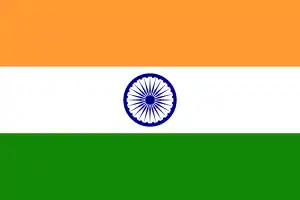 | |
Incumbent Vacant since 22 May 2004 | |
| Member of | Parliament of India Union Council of Ministers |
| Nominator | Prime Minister of India |
| Appointer | President of India |
| Inaugural holder | Vallabhbhai Patel (1947–1950) |
| Formation | 15 August 1947 |
 |
|---|
| This article is part of a series on the politics and government of India |
|
|
The office has since been only intermittently occupied, having been occupied for a little more than 11 years out of the 73 years since its inception. The first Deputy Prime Minister of India was Vallabhbhai Patel, who was also home minister in Jawaharlal Nehru's cabinet. The seventh and last deputy prime minister was L. K. Advani, who took on the role in addition to his home ministership from 2002 to 2004 in Vajpayee's government. The current government does not have a Deputy Prime Minister.
On multiple occasions, proposals have arisen to make the post permanent, but without result. The same goes for the post of deputy chief minister at the state level.
History
The first deputy prime minister was Vallabhbhai Patel, who was also home minister in Jawaharlal Nehru's cabinet. He occupied the post for 3 years until his death in 1950. The post was vacant until Morarji Desai became the second deputy prime minister in 1967.
L. K. Advani served as the seventh deputy prime minister in Atal Bihari Vajpayee's cabinet from 2002 to 2004. The post has been vacant since 2004.
List of Deputy Prime Ministers of India
Keys
| No. | Officeholder (Portfolio) |
Portrait | Term of office | Political party (Alliance) |
Prime Minister | |||
|---|---|---|---|---|---|---|---|---|
| 1 | Vallabhbhai Patel (1875–1950) (Minister of Home Affairs) |
 |
15 August 1947 | 15 December 1950 | 3 years, 122 days | Indian National Congress | Jawaharlal Nehru | |
| Vacant (15 December 1950 – 21 March 1967) | ||||||||
| 2 | Morarji Desai (1896–1995) (Minister of Finance) |
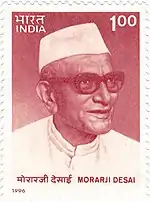 |
21 March 1967 | 6 December 1969 | 2 years, 260 days | Indian National Congress | Indira Gandhi | |
| Vacant (6 December 1969 – 24 January 1979) | ||||||||
| 3 | Charan Singh (1902–1987) (Minister of Home Affairs and Minister of Finance) |
 |
24 January 1979 [2] | 28 July 1979 | 185 days | Janata Party | Morarji Desai | |
| 4 | Jagjivan Ram (1908–1986) (Minister of Defence) |
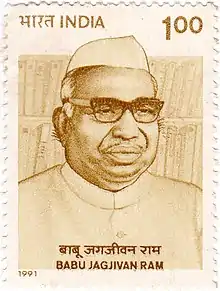 | ||||||
| 5 | Yashwantrao Chavan (1913–1984) (Minister of Home Affairs) |
 |
28 July 1979 | 14 January 1980 | 170 days | Indian National Congress (Socialist) | Charan Singh | |
| Vacant (14 January 1980 – 2 December 1989) | ||||||||
| 6 | Devi Lal (1915–2001) (Minister of Agriculture) |
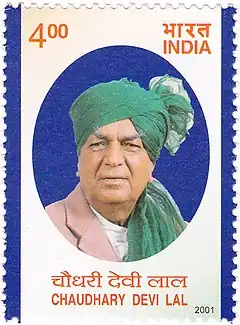 |
2 December 1989 | 10 November 1990 | 1 year, 201 days | Janata Dal (National Front) |
Vishwanath Pratap Singh | |
| 10 November 1990 | 21 June 1991 | Chandra Shekhar | ||||||
| Vacant (21 June 1991 – 5 February 2002) | ||||||||
| 7 | L. K. Advani (1927–) (Minister of Home Affairs and Minister of Personnel, Public Grievances and Pensions) |
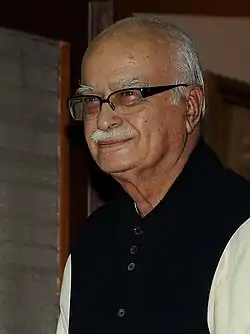 |
5 February 2002 | 22 May 2004 | 2 years, 107 days | Bharatiya Janata Party (NDA) |
Atal Bihari Vajpayee | |
| Vacant (Since 22 May 2004) | ||||||||
See also
References
- Rajendran, S. (2012-07-13). "Of Deputy Chief Ministers and the Constitution". The Hindu. Retrieved 7 November 2017.
- "COUNCIL OF MINISTERS" (PDF).